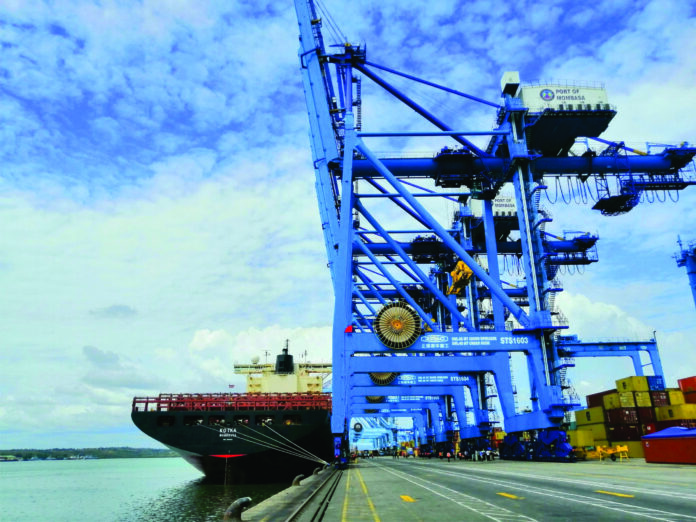The Port of Mombasa has registered a remarkable increase in cargo throughput of 14 per cent in 2024 as it handled 41.1 million tons compared to 35.98 million tons in 2023.
The container traffic saw a record-breaking increase, with a 23.53% growth to 2,005,076 TEUs, highlighting the continent’s growing role in global trade.
Container traffic through the Mombasa port reached a record 2,005,076 twenty-foot equivalent units (TEUs) in the year to December 2024, up from 1,623,080 the previous year.
This remarked performance however fell short of Kenya Ports Authority (KPA) projected 2.2 million TEUs by the end of 2024.
Container traffic experienced a significant upward trend in December 2024, with 188,495 TEUs processed compared to 152,326 TEUs handled in December 2023.
Transshipment traffic for the month reached 42,681 TEUs, a 25.8% increase, while transit traffic registered 1,184,541 tons, up by 22.2% from December 2023.
Africa’s strategic geographic location at the crossroads of major global shipping routes positions it as an essential hub for global container traffic.
Between the first half of 2018 and the first half of 2023, port calls by container ships rose by 20% in Africa, while tanker calls grew by 38%.
The Red Sea shipping crisis has had a significant impact on Africa, with some shipping lines avoiding the Red Sea route, potentially leading to higher costs for East African importers.
Effective port development and the development of a harmonized transit system in road and rail infrastructure are crucial for improving connectivity and creating trade opportunities for transit and landlocked countries in Africa.
Kenya is likely to diversify its import sources further, reducing dependency on traditional markets and exploring new partnerships, particularly within the East African region.
Container traffic through the Mombasa port grew 23.53 percent to a record 2,005,076 twenty-foot equivalent units (TEUs) in the year to December 2024, the Kenya Ports Authority (KPA) said, up from 1,623,080 registered the previous year.
Last year the port surpassed the 2023 target of 1.6 million TEUs, with the volumes reaching 1.75 million TEUs by the month of September last year.
The KPA Managing Director Captain William Ruto had attributed the growth to improved operational efficiency and streamlined processes at the facility.
Ruto noted that KPA’s cargo volumes over the past two years have outpaced projections, with current port capacity standing at 2.1 million TEUs.
He revealed that KPA is working to boost the Port’s Capacity by expanding Container Terminal 1 also known as Berth Number 19B adding that they will soon sign the contract with the contractor to add 240 meters of key length, an additional capacity of 300,000 TEUs.

“Before I took over as the CEO, the port was doing 1.4 million twenty-foot equivalent units (TEUs), and at the end of my first year, at the end of 2023, we did 1.6 million TEUs, a growth of 12 percent from the previous 0.4 percent,” Ruto said.
He noted that KPA now serves over eight transit countries, with the transit market growing by more than 35%.
Additionally, the port is implementing major upgrades, including modernizing the Terminal Operating System and acquiring advanced equipment to boost operational efficiency.
Ruto emphasized his commitment to reducing costs and promoting environmental sustainability through strategic investments, such as the new oil terminal.
He said the move has significantly reduced ship waiting times and addressed the long-standing issue of high demurrage costs, which have previously driven up fuel prices.
In a move towards greener logistics, petroleum products are now being transported via ships to Kisumu, removing approximately 158 trucks from the road per journey in a bid to cut carbon emissions and improve road safety by reducing heavy truck traffic.
“KPA’s investment in the oil terminal underscores its commitment to modernization, economic growth, and environmental sustainability. As the project progresses, it is set to reinforce Kenya’s leadership in innovative port management across Africa,” Ruto said.




